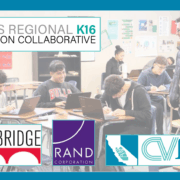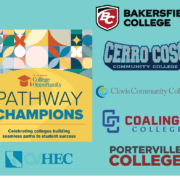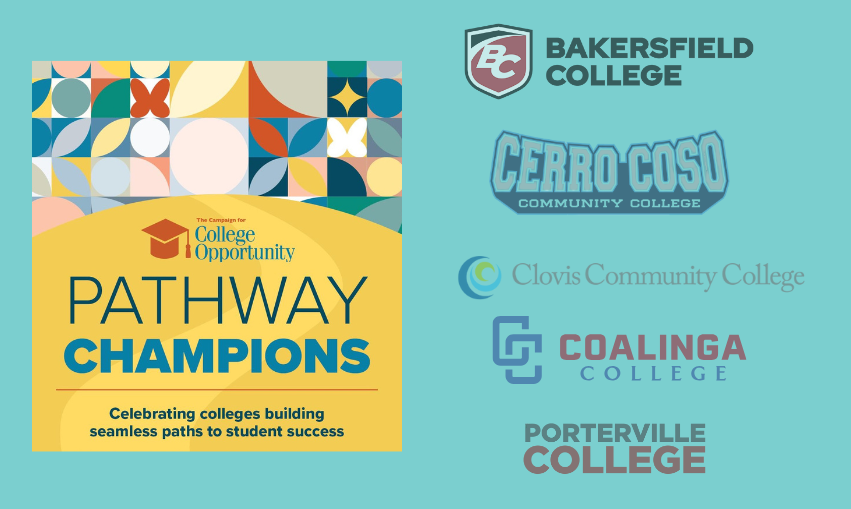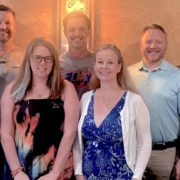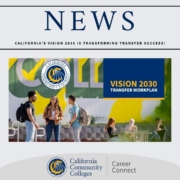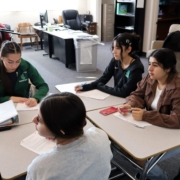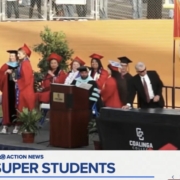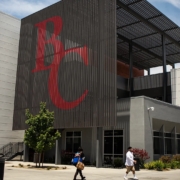These five CVHEC community college members were recently recognized as 2025 Pathway Champions by the Campaign for College Opportunity. All are actively involved in the consortium’s Central Valley Transfer Project.
Campaign for College Opportunity celebrates 40 colleges statewide for
their work to increase transfer pathways and student success in California
(NOV. 12, 2025) — The Campaign for College Opportunity recently honored 40 California Community Colleges and California State Universities (CSU) – including five Central Valley Higher Education Consortium members – as 2025 Pathway Champions for their work paving pathways to college and economic opportunity for thousands of California students by strengthening the transfer process.
The CVHEC-member California Community Colleges and California State Universities honored in a virtual awards presentation Oct. 23 as part of National Transfer Student Week (Oct. 20-24) for their work implementing equitable placement and Associate Degree for Transfer (ADT) policies were: Bakersfield College, Cerro Coso Community College, Coalinga College, Clovis Community College and Porterville College. (See category breakdown below).
According to CCO’s website press release, the 40 higher education institutions selected statewide were awarded for their efforts in implementing two landmark policies:
- equitable placement (AB 705 and 1705, Irwin), which maximizes student success in transfer-level courses at California Community Colleges; and
- implementation of Associate Degree for Transfer (ADT), which has simplified transfer between community colleges and CSUs.
These five, along with CVHEC’s 10 other community college members, have been working through the consortium’s Central Valley Transfer Project to create a clear path to transition between community college and the 10-county regions’s four-year institutions, said Ángel Ramírez, CVHEC associate director.
“Strengthening transfer pathways for valley students has been a goal of CVHEC since the launch of our CV transfer project in 2021 ,” Ramírez said.
This year, there were four categories (Pathway Champion of Placement, Pathway Champion of Placement Equity, Pathway Champion of Transfer, Pathway Champion of Transfer Equity) recognizing achievement and equity in placement and transfer outcomes.
The CCO website press release provided additional details:
“These reforms have been pivotal as students are increasingly being supported to succeed in courses that count towards their transfer goals and placed on an expedited, guaranteed path to a four-year degree, particularly Latinx and Black Californians, who have long faced disproportionate obstacles in completing their degrees.
“Supporting higher education is vital to the future of California, especially community colleges, where nearly two-thirds of California’s college students begin their higher education journey.
“Historically, transferring from community college to a four-year university has been filled with systemic barriers, with only seven percent of transfer-intending students being able to transfer within two years, prior to 2015. In the decade since, thanks to the implementation of ADT and placement policies, more students are transferring faster, with ten percent of current community college students transferring within two years and 19 percent after four years.
“While there is room for improvement, this growth showcases the vital importance of the work that this year’s Pathway Champions are doing and presents a major solution to the looming economic challenges that California faces.
Jessie Ryan, president of the Campaign for College Opportunity, said, “Our multiracial democracy and economy require us to support the growing majority of diverse students to complete college and earn a degree. At a time when students are increasingly questioning their place in higher education due to mounting attacks on their ability to thrive, we applaud the colleges that are courageously meeting the moment to implement the policies and practices we know transform student success and strengthen transfer in California.”
See:

